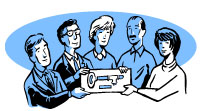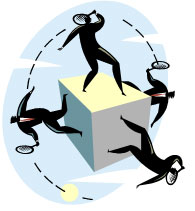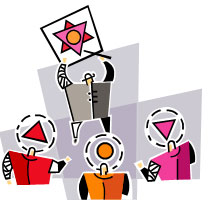
FACILITATOR TRAINING

The Facilitator Training model is based on the belief that the thinking, ideas, tools and Ethical Leadership Scales, which are integral parts of the Ethical Leadership Workshops can be taught and should be shared by chosen leaders within particular professions and organizations with their colleagues and fellow workers.
The language and ideas behind the workshops provide a sturdy and robust platform that will allow those who participate to become more aware of the effect of their choices on their workplace, their families and communities and society to which they belong.
The workshops can therefore be followed by a Facilitator Training Program with the following components:
- The content of the keynote presentations as tailored to the profession or group
- The Ethical Leadership Scales
- Hold Fire and Think, a creative learning game
- Creating an action plan for next steps
- An in-depth look at the literature and thinking about ethical leadership.
The Facilitator TrainingProgram consists of three days of training following the initial two-day Ethical Leadership Workshop. This allows all people chosen to become facilitators to understand their role within the context of their own profession or organization. After the workshop the leaders should determine the way to select from among the workshop participants those individuals who themselves model ethical leadership in their life and work, who have the respect of their colleagues, and who are good communicators. Once these individuals are selected, they should volunteer to use their skills to teach others. The leaders who chose them must be prepared to work with them to provide opportunities for them to teach others.
The Facilitator Training begins with a focus group of 5-7 people who know their profession or organization well and can help the Principals tailor the generic ideas specifically to the needs of the group. When there are a sufficient number of individuals who have taken the two-day workshop and who are ready to proceed as facilitators the three-day Facilitator Workshop can proceed.
Day One

Participants learn the mind mapping technique to facilitate creative presentations and planning. All of the material presented in the two-day workshop will be reviewed and discussed in depth from the point of view of how to present this material to their colleagues.
Day Two

The Facilitators will be divided into teams to work with the Principals in designing detailed plans on how to present the ethical leadership knowledge and practice to their colleagues.
Day Three Morning

Each team is assigned one aspect of the workshop presentation. They will work with their team to design a 40 minute presentation to the group on this aspect of the workshop. This will be followed by a 15 minute feedback session, which will allow all the participants, including the presenting team the opportunity to discuss the presentation
Day Three Afternoon

The teams begin their presentations. By 4 p.m. the facilitators have produced and discussed a mini version of the two-day workshop. They will then convene in plenary to discuss the next steps in action.
Materials Available
- Videotaped presentations of the keynote speeches by the Principals geared to their profession
- The Ethical Leadership Scales
- Hold Fire and Think rules and materials
- Key questions to lead the intervening discussions
The Internship
The Facilitators can then proceed to convene groups of colleagues to teach assisted and supported by the leaders of the profession or organization.
As part of an internship program, the new facilitators are provided with several three-hour sessions over the next 3 to 4 months to consolidate the learning introduced over the five-day training and to provide feedback on the ongoing practice and delivery of the materials.
To deepen the understanding of ethical leadership, facilitators are introduced to a series of foundational essays on the wide literature in the field. These essays have been prepared by the Principals as part of a more detailed course of study in the discipline of ethical leadership. The essays review the core ideas and thinking in the literature from which the lectures and Ethical Leadership Scales used in the ethical leadership workshops were created. Each facilitator will have full access to these essays.
In order to cover this material in the most effective manner, in each session a team of facilitators is responsible for preparing a presentation of the ideas in one or more of the essays and for leading a discussion on the relevance of these ideas to their profession or organization. Two presentations take place in each of the six sessions during the first two hours.
In the third hour discussions and problem solving on issues the facilitators have encountered in the field are led by the Principals. New partnerships and mentoring opportunities can emerge from these sessions. In the third hour of the 6th session a graduation ceremony is held to which friends, relatives and colleagues can be invited. Each facilitator who has followed through with the training program is awarded a diploma as a Facilitator of Ethical Leadership.

Follow Through
Additional groups of ethical leaders can begin their facilitator training at any time. In these sessions previously trained facilitators can volunteer to mentor the process, attending any part of the sessions on discussing and problem solving with their colleagues. In time leaders can emerge who take over the leadership of this program themselves.
Support for the Facilitator Training Program
Financial support for the facilitator training program comes from the profession, industry or organization who will benefit in material ways as the culture and reputation for ethical practice takes hold. Facilitators can be offered an appropriate stipend or other form of compensation from training budgets for the training of others.
Awards

Leaders from the industry, profession or organization can further support their teaching colleagues with a system of awards and designations that facilitators can proudly use and display in the practice of their profession.
Benefits and Outcome
Leaders of any profession who have the foresight and courage to stand up for ethical practice in their profession will be rewarded both personally and in many material ways as the outcomes of transactions in their field become increasingly distinguished by high ethical standards.
The leaders have the opportunity to move the culture of their profession, industry or organization to the place where ethical practice is the norm and where unethical practitioners are censored by their colleagues and their communities in such a way as to make unethical practice not only undesirable but also uneconomic.
Every time an ethical transaction takes place, financial benefits in the saving of legal fees and other costs of unethical practice will accrue. Over time the financial benefits to the profession, industry or organization can be substantial and their original investment in the training and support of facilitators of ethical leadership will pay off substantially.
Moreover, society as a whole will benefit as segments of the community and organizations adopt internal standards of right action, based on ethical choices grounded in respect for others and in the promotion of decent and dignified relations in the transactions of work and life.

